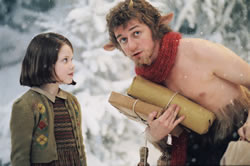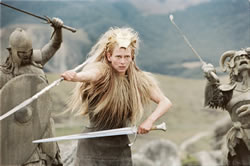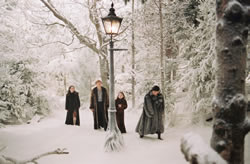 Although the last few weeks have felt like it was always Christmas, never winter, the release of this highly anticipated (and hyped) first instalment of the movie version of C.S. Lewis’s beloved Narnia series could not have been better timed. as it is an ideal family film to see on a cold winter’s evening. But does it compare with other recent adaptations of children’s favourites, i.e. Harry Potter and Lord of the Rings?
Although the last few weeks have felt like it was always Christmas, never winter, the release of this highly anticipated (and hyped) first instalment of the movie version of C.S. Lewis’s beloved Narnia series could not have been better timed. as it is an ideal family film to see on a cold winter’s evening. But does it compare with other recent adaptations of children’s favourites, i.e. Harry Potter and Lord of the Rings?
Comparisons with those two films are inevitable, with C.S. Lewis being a contemporary of Tolkien. Harry Potter, on the other hand, has now replaced Narnia as most children’s introduction to fantasy fiction. It will be interesting to see if J.K. Rowling’s books survive the generation jump in the same way as Lewis’s books.
Being one of those people who read Narnia stories at a young age, I was intrigued to see how it would adapt to the big screen, especially given the advances in SFX technology and the work done on the two aforementioned films. This is not, however, Aslan’s first screen outing, as the BBC did a fair, but less than convincing TV adaptation of four of the books. There has also been an excellent musical version of The Lion, The Witch and The Wardrobe, staged by the Royal Shakespeare Company, that captured the magic of the book. In fact, it left such a lasting impression on me I was waiting for the cast of the film to break into song in certain key scenes.
As a spectacle this film cannot compete with Lord of the Rings, but it is a much lighter story written for a younger audience. The effects are not of the same consistent high quality that we saw in Lord of the Rings or Harry Potter, with some scenes obviously shot on green-screen without paying enough attention to lighting or comping and looking more like old-fashioned back projection, which is a great pity because the magical creatures were all very believable, especially Tumnus, the Beavers and the wolves. At times it was impossible to tell whether the wolves were CGI or real.
 Apart from the amazing Tilda Swinton, as the White Witch, and Jim Broadbent as the Professor, the cast was mostly unknown, although fans of Channel 4’s Shameless, will know James McAvoy who plays Mr Tumnus. The best known actors (Ray Winstone, Dawn French, Michael Madsen, Rupert Everett and Liam Neeson) provided the voices for the animals. Ray Winstone’s diamond geezer Mr Beaver was great fun, but I was not convinced by the choice of Liam Neeson for Aslan. I always imagined a much stronger voice, maybe not James Earl Jones as he has already done a lion king, but a booming voice like Brian Blessed’s would have worked a treat. My biggest complaint with the Harry Potter films is the less than convincing performances of the junior actors, but in this film the kids are all right. The dramatic demands of the Potter films aren’t there, but the actors portraying the Pevensie children played it with the right amount of English reserve the roles commanded.
Apart from the amazing Tilda Swinton, as the White Witch, and Jim Broadbent as the Professor, the cast was mostly unknown, although fans of Channel 4’s Shameless, will know James McAvoy who plays Mr Tumnus. The best known actors (Ray Winstone, Dawn French, Michael Madsen, Rupert Everett and Liam Neeson) provided the voices for the animals. Ray Winstone’s diamond geezer Mr Beaver was great fun, but I was not convinced by the choice of Liam Neeson for Aslan. I always imagined a much stronger voice, maybe not James Earl Jones as he has already done a lion king, but a booming voice like Brian Blessed’s would have worked a treat. My biggest complaint with the Harry Potter films is the less than convincing performances of the junior actors, but in this film the kids are all right. The dramatic demands of the Potter films aren’t there, but the actors portraying the Pevensie children played it with the right amount of English reserve the roles commanded.
 Although the film did not follow the book verbatim, it did maintain the spirit of the story and captured the key parts of it in a highly believable manner. Fans of the Narnia books are not as rabidly protective of the stories as the Ringers or Potterheads, and seem to be more forgiving of any transgressions, which seems appropriate given the so-called overt Christian content of the story. I am still puzzled by the reaction and surprise to this revelation, as if it was something newly discovered about the stories. The best stories use allegory to create their mythology. Lewis never hid the fact that he was a Christian, not a Bible-thumping convert, but an intelligent man with a newly awakened love for Christ. I know as a child I was not aware that Aslan symbolised Christ, although I did have my suspicions by the final book. The Narnia stories were not meant to be a recruitment campaign for the churches. In fact, if you read some of Lewis’s other books, such as The Great Divorce, The Screwtape Letters and Surprised by Joy, you realise that he was far from being a dogmatic Christian. The idea of rebirth has been used many times in recent films. The Jedi masters seem to have a knack for cheating death, Gandalf came back bigger and brighter and even the bad guys, like Voldemort, get a reprise, and most of these films got a negative reaction from Christian fundamentalists.
Although the film did not follow the book verbatim, it did maintain the spirit of the story and captured the key parts of it in a highly believable manner. Fans of the Narnia books are not as rabidly protective of the stories as the Ringers or Potterheads, and seem to be more forgiving of any transgressions, which seems appropriate given the so-called overt Christian content of the story. I am still puzzled by the reaction and surprise to this revelation, as if it was something newly discovered about the stories. The best stories use allegory to create their mythology. Lewis never hid the fact that he was a Christian, not a Bible-thumping convert, but an intelligent man with a newly awakened love for Christ. I know as a child I was not aware that Aslan symbolised Christ, although I did have my suspicions by the final book. The Narnia stories were not meant to be a recruitment campaign for the churches. In fact, if you read some of Lewis’s other books, such as The Great Divorce, The Screwtape Letters and Surprised by Joy, you realise that he was far from being a dogmatic Christian. The idea of rebirth has been used many times in recent films. The Jedi masters seem to have a knack for cheating death, Gandalf came back bigger and brighter and even the bad guys, like Voldemort, get a reprise, and most of these films got a negative reaction from Christian fundamentalists.
Overall the film is great fantasy entertainment without too many sentimental demands on your emotions, which is a pleasant surprise for a Disney film. It is not as epic as Lord of the Rings but there is plenty to appeal to early- and pre-teens and their parents, who have grown up with the books. The film’s release will no doubt see a resurgence in sales of the books, which can only be a good thing. I look forward to seeing how they interpret the other books, especially my two favourites, The Horse and His Boy and The Voyage of the Dawntreader.
